Electrical and Electronics Engineering
Welcome to Electrical & Electronics Engineering
Highlights of the Department
- The Department has been accredited two times by NBA under Tier-II in FEB-2009 and in JULY-2014.
- The state of the art equipment in all the laboratories meeting the requirements of JNTU & AICTE Norms.
- Sophisticated equipment and software’s has been procured to facilitate the students give skills beyond the syllabus under TEQIP-II.
- In house projects to students of final year.
- Well qualified and experienced faculty.
Programs Offered
- B.Tech (EEE)
Intake – 30
About Department
- The department of EEE was established in 2002 with an intake of 60 students in the UG programme and the intake was increased to 90 in the year 2009 and upgraded to 120 in the year 2014. At present the intake is 30.
- The department has highly qualified and experienced faculty with designations of Professors, Associate Professors and Assistant Professors. The department has good infrastructure facilitates and is equipped with full-fledged laboratories. The department has Digital classrooms equipped with interactive digital flip board and also has audio-visual facilities with LCD projectors for effective teaching.
- The staff members are deputed to participate in workshops, conferences, and refresher courses to keep in pace with recent developments in the field of Electrical & Electronics Engineering. The departmental Library caters to the needs of the students & staff. The institute has an ISTE Faculty Chapter and many of our department faculties are members of ISTE who actively participate in the various activities organized by ISTE. The department has established the department association named “ELAN”.
- Every year industrial visits are arranged for students in order to improve their technical and practical skills. Students are encouraged to participate in National-level Technical Fest Contests being organized at various engineering colleges and universities. Most of students have been awarded in these contests. The department has been organizing National-level Technical Fest “VID-YOUTH” under the banner of department association ELAN every year.
Vision
Impart futuristic technical education and instill high patterns of discipline through our dedicated staff, who shall set global standards, making our students technologically superior and ethically strong, who in turn shall improve the quality of life of the human race.
Mission
To Impart Quality higher education and to undertake research and extension with emphasis on application and innovation that cater to the emerging societal needs of students of all sections enabling them to be globally competitive and socially responsible citizens with intrinsic values.
Long Term Goals
- To start Ph.D programs by getting recognition as centre for research.
- To forge strong alliances with MNCs in India for R&D in thrust areas.
- To develop technology incubators at department level.
Short Term Goals
- To get an accreditation status.
- To improve the students academic performance to 100%.
- To achieve 100% campus placements.
- To ensure faculty and staff development for effective teaching learning process.
Quality Policy
Faculty
Staff
Head of the Department
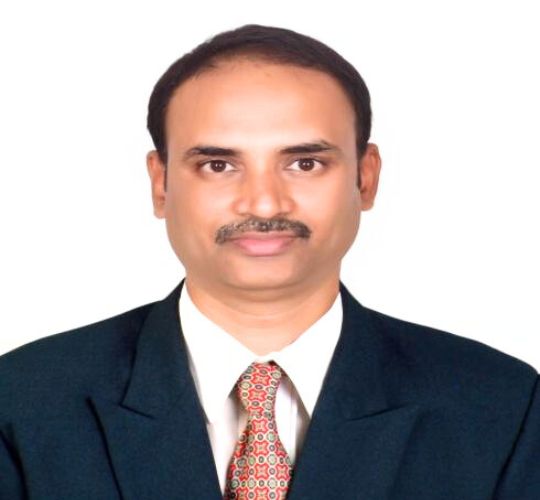
Mr. T. Raghu
M.Tech (Ph.D), MISTE
Mr.T.Raghu is currently working as a Head of the Department in Electrical and Electronics Engineering Department. He is having 18 years of teaching experience and 2 years of industrial experience. He received his Bachelor degree in Electrical and Electronics Engineering from Jawaharlal Nehru Technological University, Hyderabad and obtained his Master of Technology in Power Electronics from S R Engineering College, affiliated to Jawaharlal Nehru Technological University Hyderabad, Andhra Pradesh. He is currently pursuing Ph.D at Koneru Lakshmaiah Education Foundation, Vijayawada. He taught numerous courses at UG and PG levels. He published 12 research articles in peer reviewed international journals/conferences indexed with SCOPUS, Web of Science and SCI. He is a life member of ISTE. He reviewed two research papers of IEEE Access Journal and two research papers of Iranian Journal of Electrical and Electronics Engineering. He guided projects for 15 Post Graduate students and 50+ Under Graduate students. He attended numerous seminars, workshops, Faculty Development Programmes and conferences organised by prestigious institutions. He also organized seminars and workshops for the benefit of students and faculty. His area of interest includes Renewable Energy Sources, Power Electronics and Drives, Flexible AC Transmission system and Control systems. He had over 10+ skill enhancement certifications from NPTEL, SWAYAM and COURSERA. He worked as an active member in various committees of NBA, NAAC and UGC Autonomous status. As a member of the BOS of EEE Department, Anurag Engineering College he played a vital role in curriculum design for both undergraduate and postgraduate programs.
Infrastructure
Information Communication Technology (ICT) has the potential to transform the nature and process of teaching and learning environment / culture. Interactivity, flexibility, and convenience in an ICT supported environment enable both teachers and students to access and share ideas and information in diverse communication styles and formats. Class rooms are equipped with smart boards & LCD projectors to enhance ICT enabled teaching and learning.
Benefits with ICT enabled teaching:
- Improves student-teacher collaboration and interaction
- Encourages teachers to teach in real-time with audio and video lessons, visual multimedia & PPT presentations, 2D & 3D virtual space, etc.
- Paperless advantages
- Enhances Real-time blended teaching and learning methods
- Creates Web and Internet-based teaching and learning platform for teacher and students respectively
- Facilitates mobile integration facility.
- The implementation of ICT in OBE can effectively accomplish the goals of quality education which is a process that reduces consumption of resources and increases learning outcomes.
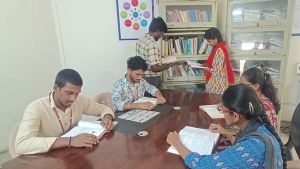 The Department Library occupies a unique place in academic and research activities of the Department. The Library maintains an excellent collection of data books, occasional papers and other documents/materials. The Library has a well equipped facility for reading. It also has one copy each of all B.Tech n & M.Tech projects carried out in the department in recent years. All these cater to the needs of students and faculty. Most of the books are of recent edition with the facility of issuing these for a specified time period. The library serves to provide a calm and comfortable ambience conductive to long hours of study. The library opens on all working days of the Institute from 9 AM to 4:30 PM.
The Department Library occupies a unique place in academic and research activities of the Department. The Library maintains an excellent collection of data books, occasional papers and other documents/materials. The Library has a well equipped facility for reading. It also has one copy each of all B.Tech n & M.Tech projects carried out in the department in recent years. All these cater to the needs of students and faculty. Most of the books are of recent edition with the facility of issuing these for a specified time period. The library serves to provide a calm and comfortable ambience conductive to long hours of study. The library opens on all working days of the Institute from 9 AM to 4:30 PM.
Laboratories
Electrical Circuits Lab
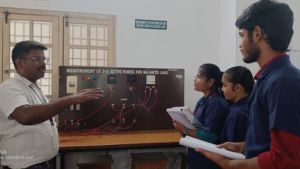 Description: This lab is having circuit elements, Regulated power supplies, Bread boards, multi meters etc. used for verification of electrical concepts and designing of electrical circuits.
Description: This lab is having circuit elements, Regulated power supplies, Bread boards, multi meters etc. used for verification of electrical concepts and designing of electrical circuits.
Outcome of the Lab:
- Use basic laboratory equipment and technology to measure electrical quantities using laboratory test equipment.
- Able to explain the concept of circuit laws and network theorems.
- Able to explain the concept of resonance, locus diagram.
Control Systems Lab
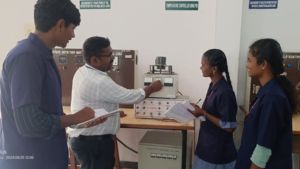 Description: This lab provides students with hands-on experience with performance analysis of control system under different transient conditions, stability analysis of control system by using different techniques.
Description: This lab provides students with hands-on experience with performance analysis of control system under different transient conditions, stability analysis of control system by using different techniques.
Outcome of the Lab:
- Will able to do various engineering projects.
- Will be able to formulate transfer functions for given control system problems and finds time response of given control system model.
- Will be able to design controller and compensator in control system.
Electrical Machines Lab
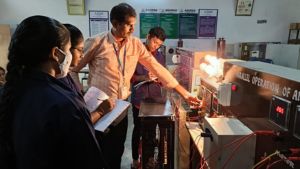 Description: This lab having all types of electrical machines used to conduct various performance tests for designing the electrical machines in the industries.
Description: This lab having all types of electrical machines used to conduct various performance tests for designing the electrical machines in the industries.
Outcome of the Lab:
- Interpret the constructional details of DC machine.
- Estimate or test the performance of DC generator.
- Analyze the performance of DC motors
- Able to predetermine the efficiency and regulation of single-phase transformer at given power factors and determine its equivalent circuit and to obtain the V and Inverted V curves of a three-phase synchronous motor
- Able to obtain performance characteristics three-phase Induction motor
- To predetermine the regulation of three–phase alternator by synchronous impedance method and Xd and Xq of a salient pole synchronous machine.
Electrical Measurements Lab
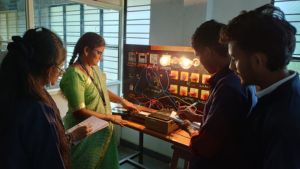 Description: This lab having all types of meters for measuring electrical quantities and used to calibrate the measuring instruments which is useful in electrical industries.
Description: This lab having all types of meters for measuring electrical quantities and used to calibrate the measuring instruments which is useful in electrical industries.
Outcome of the Lab:
- Calibrate and test single phase energy meter, calibrate PMMC voltmeter and calibrate LPF wattmeter
- Measure resistance, inductance, capacitance, 3-Φ active power and reactive power.
- Test current transformers, dielectric strength of oil, calibrate LVDT and resistance strain gauge.
Power Electronics Lab
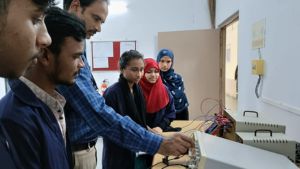 Description: This lab having different semiconductor switches used to find the performance and designing of different power electronic converters.
Description: This lab having different semiconductor switches used to find the performance and designing of different power electronic converters.
Outcome of the Lab:
- Ability to design and conduct experiments and use the techniques, skills and modern engineering tools necessary for engineering practice.
- Ability to identify, formulate and solve engineering problems.
- Ability to analyze the characteristics of power electronic devices and circuits.
Electrical Simulation Lab
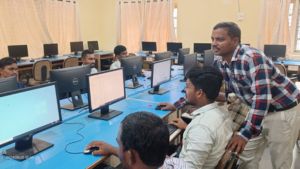 Description: This lab is equipped with advanced computers in such a way that student get to realize about the theoretical concepts learned in the class room through various simulation softwares such as Matlab and PSPICE software.
Description: This lab is equipped with advanced computers in such a way that student get to realize about the theoretical concepts learned in the class room through various simulation softwares such as Matlab and PSPICE software.
Outcome of the Lab:
- Practical Knowledge on analysis of electrical circuits and power electronic circuits.
- Practical Knowledge on stability analysis and of linear circuits and modeling of transmission lines.
- Practical Knowledge on fault analysis, load flow and transient analysis of power system.
Contact Us
Head of the Department
9553122273
hod.eee@anurag.ac.in

